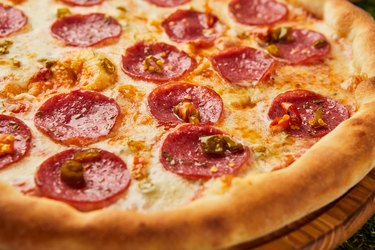
Keeping triglycerides in a healthy range is important for maintaining a healthy heart. If a blood test has revealed you have high triglycerides, lowering that number becomes a priority. You may be able to bring down those fatty deposits in your blood through diet changes and healthy swaps.
Read more: Triglycerides: What You Need to Know
Video of the Day
Video of the Day
What Are Triglycerides?
Put simply, triglycerides are a type of fat stored in your blood. When you eat more calories than you can immediately use, the body stores them in the bloodstream in the form of triglycerides.
According to the Cleveland Clinic, the normal level for triglycerides in the blood is 150 milligrams per deciliter (mg/dL) or under. One hundred fifty-one to 200 mg/dL is considered borderline high, while 201 to 499 mg/dL is high. Triglyceride levels over 500 mg/dL are categorized as extremely high. Even with an extremely high level, however, you may not have any high triglycerides symptoms or warning signs. It's typically found during routine blood work.
Many underlying conditions can cause increased triglycerides according to the American College of Cardiology (ACC). These include:
- Poorly controlled diabetes.
- Having low thyroid levels (hypothyroidism).
- Kidney disease.
It's also possible for genetics to predispose you to high triglycerides, and certain medications, alcohol and a diet high in carbohydrates, processed foods and sugary foods can also raise them, notes the ACC.
The good news is that making dietary changes can be an effective way to get your numbers back into a healthy range.
Foods to Avoid
When you think of foods that increase fat levels in your blood, you may first think of eggs, but eggs aren't the offender they were once believed to be. "Egg consumption is not associated with high triglycerides," says Ansley Hill, RDN, an Oregon-based registered dietitian nutritionist.
"They have historically had a reputation for being bad for cholesterol levels because the yolks contain high levels of cholesterol. However, recent evidence indicates that dietary cholesterol — as in, the cholesterol you eat — doesn't typically have a very strong impact on the body's blood cholesterol levels."
Instead, to manage triglycerides, Hill suggests limiting your intake of foods high in refined carbohydrates. Overdoing it on any type of carbohydrate can result in higher triglycerides, but it's especially smart to avoid refined carbs, such as those in:
- White pasta and bread.
- Sugary beverages.
- Desserts.
"Refined carbohydrates tend to be very calorie dense and are particularly easy to accidentally overconsume. Thus, they're more likely to end up being converted into triglycerides," Hill notes.
According to the Mayo Clinic, you'll also want to steer clear of foods that contain high amounts of saturated fat and any packaged foods that may still contain even small amounts of trans fat. These include:
- Red meat.
- Pizza.
- Pastries.
- Processed snacks.
It's also important to rein in alcoholic beverages. "When large quantities of alcohol are consumed regularly, the liver increases its production of fats that are shuttled through the bloodstream in the form of triglycerides," Hill says. "Cutting back on alcohol is a great step to take if you are working on lowering your triglycerides."
To create a triglyceride-lowering meal plan, focus on a balance of healthy fats, lean proteins and complex carbohydrates. "When it comes to fats, opt for unsaturated fats most of the time, such as those from nuts (and nut butters), seeds, avocado and olives," advises Hill. "Not only do these foods provide the types of fats that support heart health, but they also contain fiber. Fiber can help balance blood sugar and keep triglycerides within a healthy range."
Hill says that foods rich in heart-healthy carbohydrates include:
- Whole grains.
- Beans and other legumes.
- Fruits.
- Non-starchy vegetables like salad greens, broccoli, beets, cucumbers and peppers.
For protein that's low in saturated fat, choose:
- Fish.
- Skinless chicken.
- Beans.
- Soy foods like tofu and tempeh.
Meanwhile, per Mayo Clinic, make sweets and alcohol occasional treats, not regular indulgences. The more you make these healthier dietary choices, the more you may see a difference in your triglycerides.
But sometimes, your body might need more help lowering triglyceride levels. When lifestyle changes aren't enough, your doctor might recommend medication to bring those levels down as well, Mayo Clinic notes.
Is this an emergency? If you are experiencing serious medical symptoms, please see the National Library of Medicine’s list of signs you need emergency medical attention or call 911.